英语宾语从句用法详解
宾语从句用法详解 史上最小白的讲解与练习
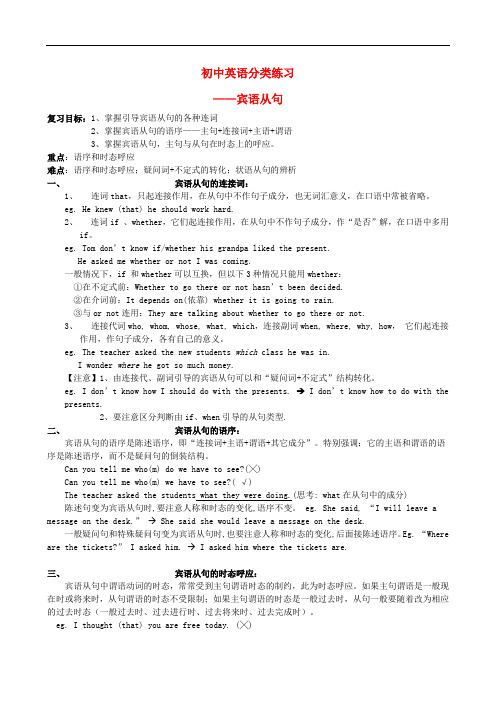
初中英语分类练习——宾语从句复习目标:1、掌握引导宾语从句的各种连词2、掌握宾语从句的语序——主句+连接词+主语+谓语3、掌握宾语从句,主句与从句在时态上的呼应。
重点:语序和时态呼应难点:语序和时态呼应;疑问词+不定式的转化;状语从句的辨析一、宾语从句的连接词:1、连词that,只起连接作用,在从句中不作句子成分,也无词汇意义,在口语中常被省略。
eg. He knew (that) he should work hard.2、连词if 、whether,它们起连接作用,在从句中不作句子成分,作“是否”解,在口语中多用if。
eg. Tom don’t know if/whether his grandpa liked the present.He asked me whether or not I was coming.一般情况下,if 和whether可以互换,但以下3种情况只能用whether:①在不定式前:Whether to go there or not hasn’t been decide d.②在介词前:It depends on(依靠) whether it is going to rain.③与or not连用:They are talking about whether to go there or not.3、连接代词who, whom, whose, what, which,连接副词when, where, why, how,它们起连接作用,作句子成分,各有自己的意义。
eg. The teacher asked the new students which class he was in.I wonder where he got so much money.【注意】1、由连接代、副词引导的宾语从句可以和“疑问词+不定式”结构转化。
eg. I don’t know how I should do with the presents. →I don’t know how to do with the presents.2、要注意区分判断由if、when引导的从句类型.二、宾语从句的语序:宾语从句的语序是陈述语序,即“连接词+主语+谓语+其它成分”。
(完整版)宾语从句用法详解
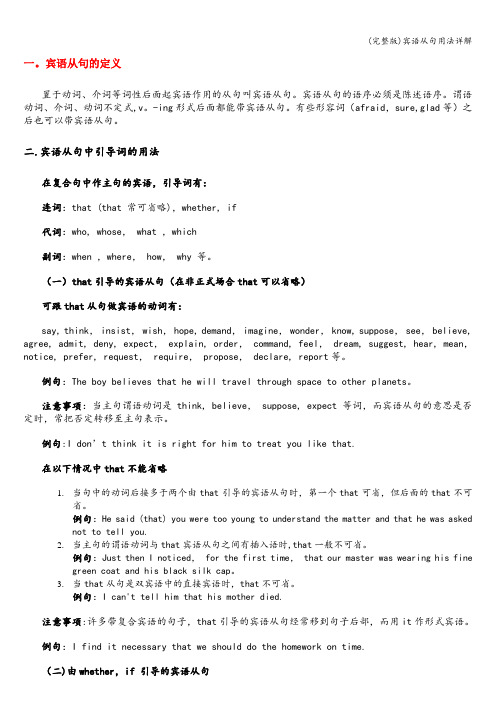
一。
宾语从句的定义置于动词、介词等词性后面起宾语作用的从句叫宾语从句。
宾语从句的语序必须是陈述语序。
谓语动词、介词、动词不定式,v。
-ing形式后面都能带宾语从句。
有些形容词(afraid,sure,glad等)之后也可以带宾语从句。
二.宾语从句中引导词的用法在复合句中作主句的宾语,引导词有:连词:that (that 常可省略),whether, if代词:who, whose, what ,which副词:when ,where, how, why 等。
(一)that引导的宾语从句(在非正式场合that可以省略)可跟that从句做宾语的动词有:say, think, insist, wish, hope, demand, imagine, wonder, know, suppose, see, believe, agree, admit, deny, expect, explain, order, command, feel, dream, suggest, hear, mean,notice, prefer, request, require, propose, declare, report等。
例句:The boy believes that he will travel through space to other planets。
注意事项:当主句谓语动词是 think, believe, suppose, expect 等词,而宾语从句的意思是否定时,常把否定转移至主句表示。
例句:I don’t think it is right for him to treat you like that.在以下情况中that不能省略1.当句中的动词后接多于两个由that引导的宾语从句时,第一个that可省,但后面的that不可省。
例句:He said (that) you were too young to understand the matter and that he was askednot to tell you.2.当主句的谓语动词与that宾语从句之间有插入语时,that一般不可省。
英语四六级复习必备英语语法——宾语从句用法详解
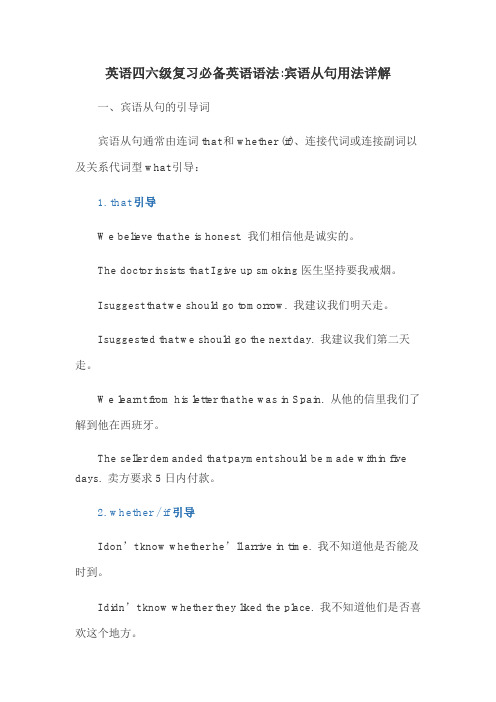
英语四六级复习必备英语语法:宾语从句用法详解一、宾语从句的引导词宾语从句通常由连词that和whether (if)、连接代词或连接副词以及关系代词型what引导:1. that引导We believe that he is honest. 我们相信他是诚实的。
The doctor insists that I give up smoking医生坚持要我戒烟。
I suggest that we should go tomorrow. 我建议我们明天走。
I suggested that we should go the next day. 我建议我们第二天走。
We learnt from his letter that he was in Spain. 从他的信里我们了解到他在西班牙。
The seller demanded that payment should be made within five days. 卖方要求5日内付款。
2. whether / if引导I don’t know whether he’ll arrive in time. 我不知道他是否能及时到。
I didn’t know whether they liked the place. 我不知道他们是否喜欢这个地方。
I’ll see whether I can induce him to accept it. 我要看看我是否能劝他接受。
I asked her whether she agreed. 我问她是否同意。
He enquired if her parents spoke Spanish. 他问她父母是否讲西班牙语。
I wonder if it’s large enough. 我不知道它是否够大。
She didn’t say if he was still alive. 她没说他是否还活着。
3. 连接代词引导I don’t know who [whom] you mean. 我不知道你指谁。
英语语法中宾语从句的用法详解

英语语法中宾语从句的用法详解宾语从句是英语学习中的常用语法,涉及到时态的转换,下面我们来详解一下宾语从句。
1、主句是一般现在时,从句根据实际情况使用任何时态。
例句:She says (that) she works from Monday to Friday.她说她从周一至周五上班。
(从句是一般现在时)She says (that) she will leave a message on his desk.她说她要在他桌子上留个便条。
(从句是一般将来时)2、主句是过去时态,从句须用过去时态的某种形式。
例句:He said there were no classes yesterday afternoon.他说昨天下午没有课。
(从句是一般过去时)He said (that) he was going to take care of the baby.他说他会去照看这个婴儿。
(从句是过去将来时)3、当宾语从句表示的是一个客观真理或者事实时,即使主句是过去时,从句也用一般现在时态。
例句:The teacher told us(that) nothing is difficult if we put our hearts into it.老师告诉我们世上无难事,只怕有心人。
She said(that) her father is twenty-eight years older thanher.她说她父亲比她大二十八岁。
He said that light travels much faster than sound.他说光比声音传播得快。
注意:当主句的谓语动词是think或believe,宾语从句要表达否定时,要把从句的否定转移到主句上。
I don't think he is going to help you with your English.我认为他不会帮你学英语的,这句话不可以翻译成:I think he isn't going to help you with your English.如果宾语从句有它的补语时,宾语从句用it代替,从句后置。
宾语从句用法详解
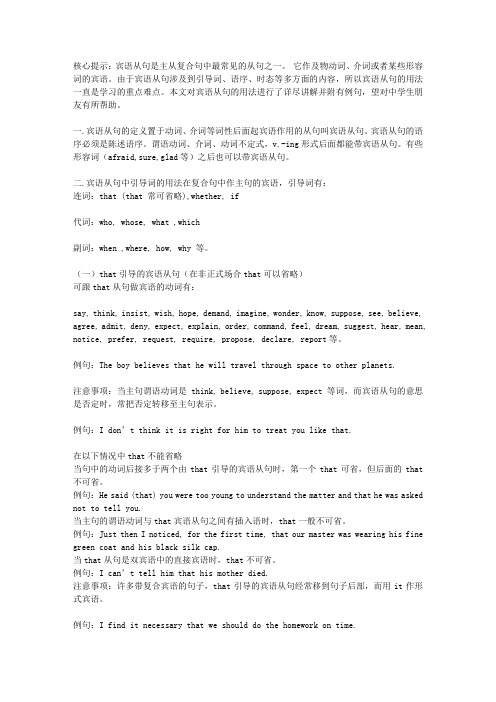
核心提示:宾语从句是主从复合句中最常见的从句之一。
它作及物动词、介词或者某些形容词的宾语。
由于宾语从句涉及到引导词、语序、时态等多方面的内容,所以宾语从句的用法一直是学习的重点难点。
本文对宾语从句的用法进行了详尽讲解并附有例句,望对中学生朋友有所帮助。
一.宾语从句的定义置于动词、介词等词性后面起宾语作用的从句叫宾语从句。
宾语从句的语序必须是陈述语序。
谓语动词、介词、动词不定式,v.-ing形式后面都能带宾语从句。
有些形容词(afraid,sure,glad等)之后也可以带宾语从句。
二.宾语从句中引导词的用法在复合句中作主句的宾语,引导词有:连词:that (that 常可省略),whether, if代词:who, whose, what ,which副词:when ,where, how, why 等。
(一)that引导的宾语从句(在非正式场合that可以省略)可跟that从句做宾语的动词有:say, think, insist, wish, hope, demand, imagine, wonder, know, suppose, see, believe, agree, admit, deny, expect, explain, order, command, feel, dream, suggest, hear, mean, notice, prefer, request, require, propose, declare, report等。
例句:The boy believes that he will travel through space to other planets.注意事项:当主句谓语动词是 think, believe, suppose, expect 等词,而宾语从句的意思是否定时,常把否定转移至主句表示。
例句:I don’t think it is right for him to treat you like that.在以下情况中that不能省略当句中的动词后接多于两个由that引导的宾语从句时,第一个that可省,但后面的that 不可省。
英语宾语从句用法详解

英语宾语从句用法详解英语宾语从句是一个句子作为动词的宾语,一般由连词引导。
宾语从句可以出现在形容词、动词、名词的后面。
1. 形容词后面的宾语从句:形容词常用于某些短语动词后面,如believe, think, know, feel, understand, doubt等。
例如:- I believe that he is right.- She knows what she wants.- I doubt if they will come.- Do you understand what I'm saying?2. 动词后面的宾语从句:动词后面的宾语从句可以是及物动词或短语动词的宾语。
例如:- She said that she was tired.- He asked if I wanted anything to eat.- They want to know where we are going.- We saw that they were arguing.根据从句的内容和从句所在的动词,宾语从句可以有以下几种类型:- 陈述句型:that引导的从句,表示陈述或描述。
例如:She said that she would come.- 一般疑问句型:由疑问词引导的从句,以完整疑问句的形式出现。
例如:He asked me where I lived.- 特殊疑问句型:由疑问词引导的从句,以特殊疑问句的形式出现。
例如:Do you know what time it is?- 否定句型:由“whether...or not”或“if...not”引导的从句。
例如:I don't know whether he will come or not.3. 名词后面的宾语从句:名词后面的宾语从句通常由that引导,也可以使用其他连词引导,如whether, if, when, where等。
宾语从句用法详解(精编)

宾语从句用法详解一、宾语从句的定义比较:We know him. (简单句)主语S 谓语V 宾语OWe know that he likes English. (复合句)主语S 谓语V 主语S 谓语V 宾语S置于动词、介词等词性后面起宾语作用的从句叫宾语从句。
宾语从句的语序必须是陈述语序。
谓语动词、介词、动词不定式,v.-ing形式后面都能带宾语从句。
有些形容词(afraid,sure,glad等)之后也可以带宾语从句。
二.宾语从句中引导词的用法在复合句中作主句的宾语,引导词有:连词:that (that 常可省略),whether, if代词:who, whose, what ,which副词:when ,where, how, why 等。
(一)that引导的宾语从句(在非正式场合that可以省略)可跟that从句做宾语的动词有:say, think, insist, wish, hope, demand, imagine, wonder, know, suppose, see, believe, agree, admit, deny, expect, explain, order, command, feel, dream, suggest, hear, mean, notice, prefer, request, require, propose, declare, report等。
例句:The boy believes that he will travel through space to other planets.注意:A、否定前移:当主句谓语动词是think, believe, suppose, expect 等词,而宾语从句的意思是否定时,常把否定转移至主句表示。
例句:I don’t think it is right for him to treat you like that.B、在以下情况中that不能省略1、当句中的动词后接多于两个由that引导的宾语从句时,第一个that可省,但后面的that不可省。
宾语从句用法详解
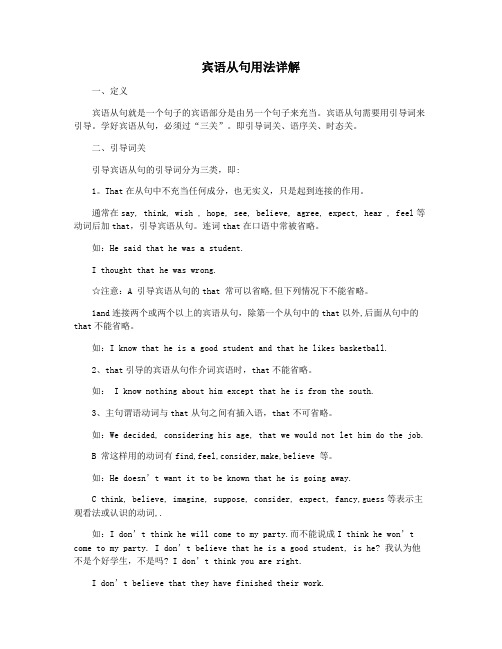
宾语从句用法详解一、定义宾语从句就是一个句子的宾语部分是由另一个句子来充当。
宾语从句需要用引导词来引导。
学好宾语从句,必须过“三关”。
即引导词关、语序关、时态关。
二、引导词关引导宾语从句的引导词分为三类,即:1。
That在从句中不充当任何成分,也无实义,只是起到连接的作用。
通常在say, think, wish , hope, see, believe, agree, expect, hear , feel等动词后加that,引导宾语从句。
连词that在口语中常被省略。
如:He said that he was a student.I thought that he was wrong.☆注意:A 引导宾语从句的that 常可以省略,但下列情况下不能省略。
1and连接两个或两个以上的宾语从句,除第一个从句中的that以外,后面从句中的that不能省略。
如:I know that he is a good student and that he likes basketball.2、that引导的宾语从句作介词宾语时,that不能省略。
如: I know nothing about him except that he is from the south.3、主句谓语动词与that从句之间有插入语,that不可省略。
如:We decided, considering his age, that we would not let him do the job.B 常这样用的动词有find,feel,consider,make,believe 等。
如:He doesn’t want it to be known that he is going away.C think, believe, imagine, suppose, consider, expect, fancy,guess等表示主观看法或认识的动词,.如:I don’t thin k he will come to my party.而不能说成I think he won’t come to my party. I don’t believe that he is a good student, is he? 我认为他不是个好学生,不是吗? I don’t think you are right.I don’t believe that they have finished their work.比较:she believes that I am not a good student.2常可以互换。
(完整版)宾语从句用法详解

宾语从句用法及其例句宾语从句,是名词性从句的一种。
在主从复合句中充当宾语,位于及物动词、介词或复合谓语之后的从句称为宾语从句。
宾语从句分为三类:动词的宾语从句,介词的宾语从句和形容词的宾语从句。
宾语从句用法时态:1.主句用一般现在时,从句可用任意时态。
2.主句用过去时,从句用过去某个时态。
3.主句用过去时,从句是客观真理时,只用一般现在时。
一、宾语从句的连接词(1)从属连词连接宾语从句的从属连词主要有that,if,whether.that引导表示陈述句的宾语从句,if和whether引导表示“是否”的一般疑问句的宾语从句.He told me (that he would) go to the college the next year他告诉我他明年上大学.I don’t know if there will be a bus any more.我不知道是否还会有公交车.Nobody knew whether he could pass the exam.没人知道他是否会通过考试.(2)连接代词连接代词主要有who, whom ,whose ,what ,whoever ,whomever ,whosever, whatever, whichever等.连接代词一般指疑问,但what, whatever除了指疑问外,也可以指陈述.Do you know who has won Red Alert game?你知道是谁赢得了红色警报的游戏?The book will show you what the best CEOs should know.这本书会告诉你最好的执行总裁该了解些什么.Have you determined whichever you should buy,a Motorola or Nokiacell phone?你决定好是买诺基亚还是摩托罗拉的电话了吗?(3)连接副词连接副词主要有when,where,why,how,whenever,wherever,however等.He didn’t tell me when we should meet again.他没有告诉我什么时候我们能再见面.Could you please tell me how you use the new panel?你能告诉我怎么用这个新的操作盘吗?None of us knows where these new parts can be bought.没有人知道这些的新的零件能在哪里买到.动宾重点,介宾掌握,形宾了解二、动词的宾语从句(1)大多数动词都可以带宾语从句We all expect that they will win , for members of their team are stronger.我们都预料他们会赢,因为他们的队员更强壮.He told us that they would help us through the whole work.他告诉我们在整个工作中,他们都会帮忙的.(2)部分“动词+副词”结构也可以带宾语从句I have found out that all the tickets for the concert have been sold out.我发现这场音乐会的所有票都卖光了.Can you work out how much we will spend during the trip?你能计算出这次旅行我们将花费多少钱吗?(3)动词短语也可以带宾语从句常见的这些词有:make sure确保make up one’s mind下决心keep in mind牢记Make sure that there are no mistakes in your papers before youturn them in.在上交试卷前确保没有任何错误.可运用形式宾语it代替的宾语从句①动词find,feel,consider,make,believe等后面有宾语补足语的时候,则需要用it 做形式宾语而将that宾语从句后置.I think it necessary that we take plenty of hot water every day .我认为每天多喝开水是有必要的.I feel it a pity that I haven’t been to the get-together.我没去聚会,感觉非常遗憾.I have made it a rule that I keep diaries.我每天写日记成了习惯.We all find it important that we (should) make a quick decisionabout this mater.我们都认为对这件事马上做出决定很重要.②有些动词带宾语从句时需要在宾语与从句前加it这类动词主要有:hate, take , owe, have, see to.I hate it when they with their mouths full of food.我讨厌他们满嘴食物时说话.He will have it that our plan is really practical.他会认为我们的计划确实可行.We take it that you will agree with us.我们认为你会同意我们的.When you start the engine, you must see to it that car is inneutral.开启发动机时, 一定要使汽车的离合器处于空挡位置.③若宾语从句是wh-类,则不可用it代替We all consider what you said to be unbelievable.我们都认为你所说的是不可信的.We discovered what we had learned to be valuable.我们发现我们所学到的东西都是有用的.三、介词的宾语从句(1)用wh-类的介词宾语从句We are talking about whether we admit students into our club.我们正在讨论是否让学生加入我们的俱乐部.The new book is about how Shenzhou 6 manned spaceship wassent up into space.这本新书是关于神州6号载人航天飞船是如何升入太空的.(2)用that,if引导的介词宾语从句有时候except,but,besides三个介词后可见到that引导的宾语从句I know nothing about my new neighbor except that he used towork with a company.对于我的新邻居我只知道他曾在一家公司上班,其他一无所知.四、形容词的宾语从句有些形容词具有动词的含义,所以也可以带一个宾语从句,常用来引导宾语从句的形容词有: sure,certain,glad,please,happy,sorry,afraid,satisfied,surprisedI am sure I will pass the exam.我确信我会通过考试.I am sorry that I have troubled you so long.很抱歉我这么长时间在打扰你.He is glad that Li Ming went to see him when he was ill.他很高兴在他生病的时候李明能去看望他.五、if,whether在宾语从句中的区别①if和whether在作“是否”解时,引导宾语从句常放在动词know,ask,care,wond er,find out等之后,介词后一般不用if②少数动词,如:leave,put,discuss,doubt后的宾语从句常用whether.③whether后可以加or not,但是if不可以.④在不定式前只能用whether.(如:I can’t decide whether to stay. 我不能决定是否留下。
宾语从句用法详解
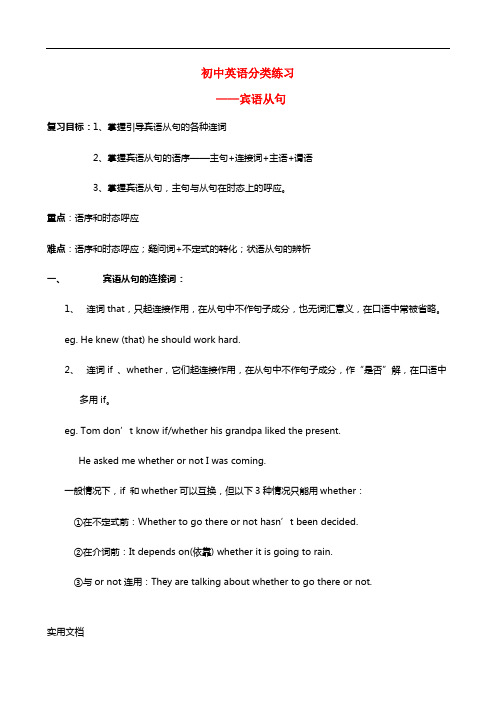
初中英语分类练习——宾语从句复习目标:1、掌握引导宾语从句的各种连词2、掌握宾语从句的语序——主句+连接词+主语+谓语3、掌握宾语从句,主句与从句在时态上的呼应。
重点:语序和时态呼应难点:语序和时态呼应;疑问词+不定式的转化;状语从句的辨析一、宾语从句的连接词:1、连词that,只起连接作用,在从句中不作句子成分,也无词汇意义,在口语中常被省略。
eg. He knew (that) he should work hard.2、连词if 、whether,它们起连接作用,在从句中不作句子成分,作“是否”解,在口语中多用if。
eg. Tom don’t know if/whether his grandpa liked the present.He asked me whether or not I was coming.一般情况下,if 和whether可以互换,但以下3种情况只能用whether:①在不定式前:Whether to go there or not hasn’t been decid ed.②在介词前:It depends on(依靠) whether it is going to rain.③与or not连用:They are talking about whether to go there or not.实用文档3、连接代词who, whom, whose, what, which,连接副词when, where, why, how,它们起连接作用,作句子成分,各有自己的意义。
eg. The teacher asked the new students which class he was in.I wonder where he got so much money.【注意】1、由连接代、副词引导的宾语从句可以和“疑问词+不定式”结构转化。
eg. I don’t know how I should do with the presents. I don’t know how to do with the presents.2、要注意区分判断由if、when引导的从句类型.二、宾语从句的语序:宾语从句的语序是陈述语序,即“连接词+主语+谓语+其它成分”。
宾语从句结构和用法总结详解
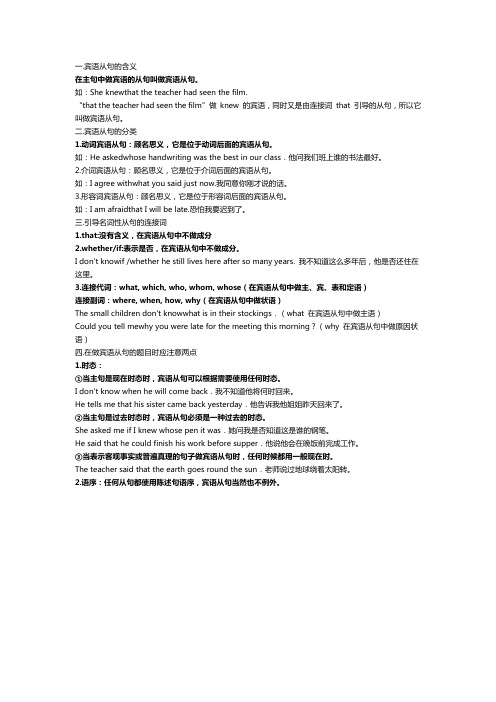
一.宾语从句的含义在主句中做宾语的从句叫做宾语从句。
如:She knewthat the teacher had seen the film.“that the teacher had seen the film”做knew 的宾语,同时又是由连接词that 引导的从句,所以它叫做宾语从句。
二.宾语从句的分类1.动词宾语从句:顾名思义,它是位于动词后面的宾语从句。
如:He askedwhose handwriting was the best in our class.他问我们班上谁的书法最好。
2.介词宾语从句:顾名思义,它是位于介词后面的宾语从句。
如:I agree withwhat you said just now.我同意你刚才说的话。
3.形容词宾语从句:顾名思义,它是位于形容词后面的宾语从句。
如:I am afraidthat I will be late.恐怕我要迟到了。
三.引导名词性从句的连接词1.that:没有含义,在宾语从句中不做成分2.whether/if:表示是否,在宾语从句中不做成分。
I don't knowif /whether he still lives here after so many years. 我不知道这么多年后,他是否还住在这里。
3.连接代词:what, which, who, whom, whose(在宾语从句中做主、宾、表和定语)连接副词:where, when, how, why(在宾语从句中做状语)The small children don't knowwhat is in their stockings.(what 在宾语从句中做主语)Could you tell mewhy you were late for the meeting this morning?(why 在宾语从句中做原因状语)四.在做宾语从句的题目时应注意两点1.时态:①当主句是现在时态时,宾语从句可以根据需要使用任何时态。
宾语从句三类的用法详解_宾语从句 英语语法.doc

宾语从句三类的用法详解_宾语从句宾语从句可以分为三类(1).动词的宾语从句1.1 大多数位于动词后面Eg:I hope you can join us in the game.1.2 有些是动词+副词后Find out / point out / figure out / turn out/ figure outEg:Can you figure out what the poet really means in this poem?1.3 有些动词短语后面Make sure / make up ones mind / keep in mindEg; we should keep in mind that sports can be a great boost to our health.(2) it 作形式宾语代替宾语从句第一类动词; find/ feel/ think/ consider/ make / believe/ guess/ suppose /assume等后面有宾语不足语时,需要用it 作形式宾语而将that引导的真正的宾语从句后置。
Eg:I think it necessary that we do some sporting.第二类动词带宾语从句时需要在从句前面加it。
这类词:hate / like/ dislike/ appreciate/ depend on/ see to /Eg: I hate it when they talk without considering others feeling.但是如果宾语从句是WH-类引导的,其后面有to be 短语作宾语补足语,不可以用it 代替。
We all consider what you said to be unbelievable. (right)We all consider it to be unbelievable what you said .(wrong) (3) 形容词后的宾语从句Adj: sure / certain/ glad/ pleased/ happy / afraid / sorry 等等。
宾语从句用法详解(例句丰富)
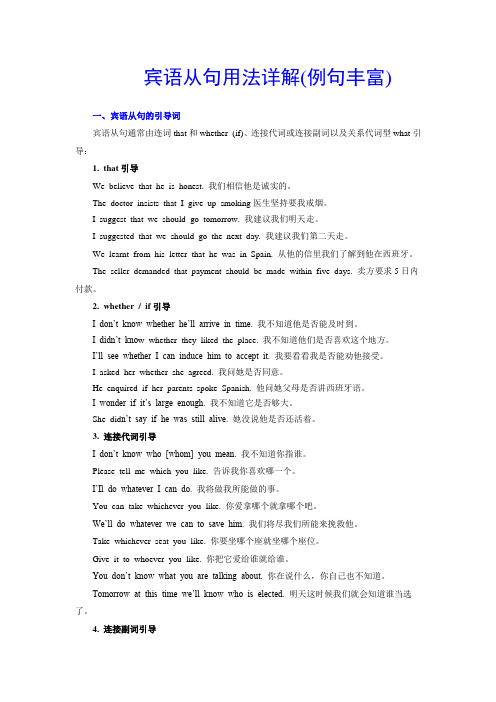
宾语从句用法详解(例句丰富)一、宾语从句的引导词宾语从句通常由连词that和whether (if)、连接代词或连接副词以及关系代词型what引导:1. that引导We believe that he is honest. 我们相信他是诚实的。
The doctor insists that I give up smoking医生坚持要我戒烟。
I suggest that we should go tomorrow. 我建议我们明天走。
I suggested that we should go the next day. 我建议我们第二天走。
We learnt from his letter that he was in Spain. 从他的信里我们了解到他在西班牙。
The seller demanded that payment should be made within five days. 卖方要求5日内付款。
2. whether / if引导I don’t know whether he’ll arrive in time. 我不知道他是否能及时到。
I didn’t kno w whether they liked the place. 我不知道他们是否喜欢这个地方。
I’ll see whether I can induce him to accept it. 我要看看我是否能劝他接受。
I asked her whether she agreed. 我问她是否同意。
He enquired if her parents spoke Spanish. 他问她父母是否讲西班牙语。
I wonder if it’s large enough. 我不知道它是否够大。
She did n’t say if he was still alive. 她没说他是否还活着。
3. 连接代词引导I don’t know who [whom] you mean. 我不知道你指谁。
宾语从句三类的用法详解

宾语从句三类的用法详解(最新版)编制人:__________________审核人:__________________审批人:__________________编制学校:__________________编制时间:____年____月____日序言下载提示:英语语法是针对英语语言进行研究后,系统地总结归纳出来的一系列语言规则。
英语语法的精髓在于掌握语言的使用。
而且,英语语法是一套完整的语言知识体系。
如果你想英语能够更进一步,英语语法就是其中的主要一环。
Download tips: English grammar is a series of language rules that are systematically summarized after studying the English language. The essence of English grammar lies in mastering the use of language. Moreover, English grammar is a complete language knowledge system. If you want English to go further, English grammar is the main link.正文内容宾语从句可以分为三类(1).动词的宾语从句1.1 大多数位于动词后面Eg:I hope you can join us in the game.1.2 有些是“动词+副词”后Find out / point out / figure out / turn out/ figure outEg: Can you figure out what the poet really means in this poem?1.3 有些动词短语后面Make sure / make up one’s mind / keep in mindEg; we should keep in mind that sports can be a great boost to our health.(2) it 作形式宾语代替宾语从句第一类动词; find/ feel/ think/ consider/ make / believe/ guess/ suppose /assume等后面有宾语不足语时,需要用it 作形式宾语而将that引导的真正的宾语从句后置。
初中英语中的宾语从句用法详解
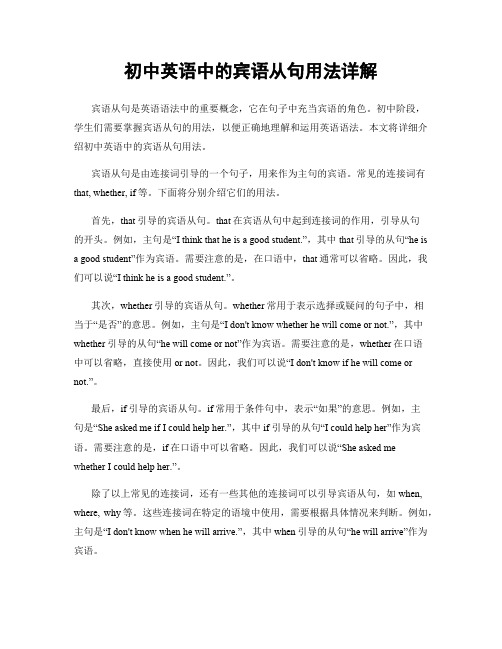
初中英语中的宾语从句用法详解宾语从句是英语语法中的重要概念,它在句子中充当宾语的角色。
初中阶段,学生们需要掌握宾语从句的用法,以便正确地理解和运用英语语法。
本文将详细介绍初中英语中的宾语从句用法。
宾语从句是由连接词引导的一个句子,用来作为主句的宾语。
常见的连接词有that, whether, if等。
下面将分别介绍它们的用法。
首先,that引导的宾语从句。
that在宾语从句中起到连接词的作用,引导从句的开头。
例如,主句是“I think that he is a good student.”,其中that引导的从句“he is a good student”作为宾语。
需要注意的是,在口语中,that通常可以省略。
因此,我们可以说“I think he is a good student.”。
其次,whether引导的宾语从句。
whether常用于表示选择或疑问的句子中,相当于“是否”的意思。
例如,主句是“I don't know whether he will come or not.”,其中whether引导的从句“he will come or not”作为宾语。
需要注意的是,whether在口语中可以省略,直接使用or not。
因此,我们可以说“I don't know if he will come or not.”。
最后,if引导的宾语从句。
if常用于条件句中,表示“如果”的意思。
例如,主句是“She asked me if I could help her.”,其中if引导的从句“I could help her”作为宾语。
需要注意的是,if在口语中可以省略。
因此,我们可以说“She asked me whether I could help her.”。
除了以上常见的连接词,还有一些其他的连接词可以引导宾语从句,如when, where, why等。
这些连接词在特定的语境中使用,需要根据具体情况来判断。
中考英语宾语从句
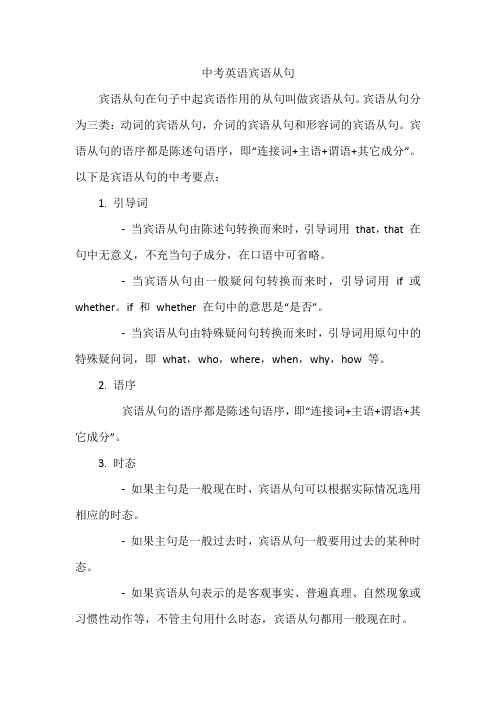
中考英语宾语从句
宾语从句在句子中起宾语作用的从句叫做宾语从句。
宾语从句分为三类:动词的宾语从句,介词的宾语从句和形容词的宾语从句。
宾语从句的语序都是陈述句语序,即“连接词+主语+谓语+其它成分”。
以下是宾语从句的中考要点:
1. 引导词
- 当宾语从句由陈述句转换而来时,引导词用that,that 在句中无意义,不充当句子成分,在口语中可省略。
- 当宾语从句由一般疑问句转换而来时,引导词用if 或whether。
if 和whether 在句中的意思是“是否”。
- 当宾语从句由特殊疑问句转换而来时,引导词用原句中的特殊疑问词,即what,who,where,when,why,how 等。
2. 语序
宾语从句的语序都是陈述句语序,即“连接词+主语+谓语+其它成分”。
3. 时态
- 如果主句是一般现在时,宾语从句可以根据实际情况选用相应的时态。
- 如果主句是一般过去时,宾语从句一般要用过去的某种时态。
- 如果宾语从句表示的是客观事实、普遍真理、自然现象或习惯性动作等,不管主句用什么时态,宾语从句都用一般现在时。
宾语从句是初中英语语法中的一个重要知识点,需要学生熟练掌握引导词、语序和时态等方面的内容。
【英语知识点】初中英语宾语从句用法详解

【英语知识点】初中英语宾语从句用法详解宾语从句,是名词性从句的一种。
在主从复合句中充当宾语,位于及物动词、介词或复合谓语之后的从句称为宾语从句。
本文整理了宾语从句用法,欢迎阅读。
一、宾语从句的连接词:1、连词that,只起连接作用,在从句中不作句子成分,也无词汇意义,在口语中常被省略。
eg. He knew (that) he should work hard.2、连词if 、whether,它们起连接作用,在从句中不作句子成分,作“是否”解,在口语中多用if。
eg. Tom don’t know if/whether his grandpa liked the present.He asked me whether or not I was ing.一般情况下,if 和whether可以互换,但以下3种情况只能用whether:①在不定式前:Whether to go there or not hasn’t bee n decided.②在介词前:It depends on(依靠) whether it is going to rain.③与or not连用:They are talking about whether to go there or not.3、连接代词who, whom, whose, what, which,连接副词when, where, why, how,它们起连接作用,作句子成分,各有自己的意义。
eg. The teacher asked the new students which class he was in.I wonder where he got so much money.【注意】1、由连接代、副词引导的宾语从句可以和“疑问词+不定式”结构转化。
eg. I don’t know how I should do with the presents. è I don’t know how to do with the presents.2、要注意区分判断由if、when引导的从句类型.二、宾语从句的语序:宾语从句的语序是陈述语序,即“连接词+主语+谓语+其它成分”。
- 1、下载文档前请自行甄别文档内容的完整性,平台不提供额外的编辑、内容补充、找答案等附加服务。
- 2、"仅部分预览"的文档,不可在线预览部分如存在完整性等问题,可反馈申请退款(可完整预览的文档不适用该条件!)。
- 3、如文档侵犯您的权益,请联系客服反馈,我们会尽快为您处理(人工客服工作时间:9:00-18:30)。
英语宾语从句用法详解初中英语分类练习——宾语从句复习目标:1、掌握引导宾语从句的各种连词2、掌握宾语从句的语序——主句+连接词+主语+谓语3、掌握宾语从句,主句与从句在时态上的呼应; 重点:语序和时态呼应难点:语序和时态呼应;疑问词+不定式的转化;状语从句的辨析一、宾语从句的连接词:1、连词that,只起连接作用,在从句中不作句子成分,也无词汇意义,在口语中常被省略; eg. He knew that he should work hard.2、连词if、whether,它们起连接作用,在从句中不作句子成分,作“是否”解,在口语中多用if; eg. Tom don’t know if/whether his grandpa liked the present. He asked me whether or not I was coming. 一般情况下,if和whether可以互换,但以下3种情况只能用whether:①在不定式前:Whether to go there or not hasn’t been decided. ②在介词前:It depends on依靠 whether it is going to rain. ③与or not连用:They are talking about whether to go there or not.3、连接代词who, whom, whose, what, which,连接副词when, where, why, how,它们起连接作用,作句子成分,各有自己的意义; eg. The teacher asked the new studentswhichclass he was in. I wonderwherehe got so much money. 注意1、由连接代、副词引导的宾语从句可以和“疑问词+不定式”结构转化; eg. I don’t know how I should do with the presents.èI don’t know how to do with the presents. 2、要注意区分判断由if、when引导的从句类型. 二、宾语从句的语序:宾语从句的语序是陈述语序,即“连接词+主语+谓语+其它成分”;特别强调:它的主语和谓语的语序是陈述语序,而不是疑问句的倒装结构; Can you tell me whom do we have to see╳ Can you tell me whom we have to see√ The teacher asked the studentswhat they were doing.思考: what在从句中的成分陈述句变为宾语从句时,要注意人称和时态的变化,语序不变;eg. She said, “I will leave a message on the desk.”àShe said she would leave a message on the desk. 一般疑问句和特殊疑问句变为宾语从句时,也要注意人称和时态的变化,后面接陈述语序;Eg. “Where are the tickets ” I asked him.àI asked him where the tickets are. 三、宾语从句的时态呼应:宾语从句中谓语动词的时态,常常受到主句谓语时态的制约,此为时态呼应;如果主句谓语是一般现在时或将来时,从句谓语的时态不受限制;如果主句谓语的时态是一般过去时,从句一般要随着改为相应的过去时态一般过去时、过去进行时、过去将来时、过去完成时; eg. I thought that you are free today. ╳ I thought that youwould befree today. √注意当宾语从句叙述的是客观真理时,不管主句谓语的时态如何,从句都用一般现在时; eg. The teacher told us that the earthmovesaround the sun. 四、其他需要说明的问题: 1、标点由主句决定,如主句是陈述句、祈使句,则用句号;是疑问句则用问号; eg.I heard she had been to the Great Wall.Can you tell me which bus I should take2、要注意个别句子中主从句人称的一致; 五、宾语从句和状语从句的区分: eg. 1 I will go out tomorrowif it is fine. 2 I don’t knowif the train has arrived. 句1中if引导的是状语从句;这个从句表示“条件”,修饰主句;整个句子的意思是如果明天天气好,我就出去;句2中if引导的是宾语从句,充当谓语动词don’t know的宾语;整个句子的意思是我不知道火车是否到达; 判断方法:1、可以从整个句式看;状语从句一般可以放在主句的前面或后面个别除外,宾语从句只能放在主句谓语动词之后; 2、从引导词看;if充当宾语从句的连接词时,相当于whether,词义为“是否”,充当状语从句的连接词时,词义为“如果”;when充当宾语从句的连接词时,意为“什么时候”,充当状语从句的连接词时,意为“当……的时候”;3、从时态看;if和when作连接词时,引导宾语从句要注意:从句的谓语动词的时态应根据主句的时态作相应的变化;if和when充当从属连词时,引导条件和时间状语从句,若主句的谓语动词用一般将来时,则从句的时态应用一般现在时表示将来; 实战演练一、例题选讲例1 I don’t know ________ he will come or not. A. how B. whether C. weatherD. when 答案: B 提示:在宾语从句中出现了or not,这里只能用whether; 第二题答案为B,根据题意问他们何时回来,所以要用when; 例2 Can you tell me ________they will come backA. where B. when C. which D. who 答案: B 提示:根据题意问他们何时回来,所以要用when; 例3 Have you seen the doctorHe asked me.两句并一句答案: He asked me if / whether I had seen a doctor 提示:是一般疑问句,连接词应为if / whether 例4 How can we get to the science museum Could you tell us两句并一句答案: Could you tell me how we can get to the science museum提示:特殊疑问句,连接词就是它本身的特殊疑问词how,将情态动词can放在主语me之后,时态运用取决于主句;主句could you tell me是委婉语气,是一般现在时,所以从句是什么时态就用什么时态; 直接引语变间接引语一、如何变人称:直接引语变间接引语时,如果从句中的主语是第一人称或被第一人称所修饰;从句中的人称要按照主句中主语的人称变化如: She said. "My brother wants to go with me. "→She said her brother wanted to go with her. “直接引语变间接引语时,若从句中的主语及宾语是第二人称;或被第二人你所修饰;从句中的人称要跟引号外的主句的宾语一致;如果引号外的主句没有宾语;也可以用第一人称,如: He said to Kate. "How is your sister now" →He asked Kate how her sister was then; “直接引语变间接引语时;如果从句中的主语及宾语是第三人称或被第三人称所修饰从句中的人称一般不需要变化如: Mr Smith said;"Jack is a good worker;"→Mr Smith said Jack was a good worker; 二、如何变时态:直接引语在改为间接引语时、时态需要做相应的调整;如果主句谓语动词为现在范畴的时态或一般将来时,则间接引语中的动词仍保持直接引语原来时态;如果主句谓语动词为过去时,间接引语中的动词时态按下列变化: 1一般现在时变为一般过去时 2现在进行时变为过去进行时 3一般将来时变为过去将来时 4现在完成时变为过去完成时 5一般过去时变为过去完成时 6过去完成时不变,仍为过去完成时要注意在以下几种情况: 1如果直接引语是表示客观真理时,变为间接引语,一般现在时不改为一般过去时;如: The teacher said "The earth goes round the sun." →The teacher said that the earth goes round the sun. 2直接引语中有具体的过去某年、某月、某日作状语,变为间接引语时,时态不变;如: He said to me, "I was born in 1973." →He told me that he was born in 1973. 3如果直接引语所述事实在当时和目前同样生效,变为间接宾语时,一般现在时不改为一般过去时;如: He said, "I'm a boy, not a girl." →He said that he is a boy ,not a girl. 4直接引语如果是一般现在时;表示一种反复出现或习惯性的动作,变间接引语时,时态不变;如: The girl said, "I get up at six every morning." →The girl said that she gets up at six every morning. 5如果直接引语中含有since, when, while引导的表示过去时间的状语从句,在变为间接引语时,只改变主句中的谓语动词,从句的一般过去时则不变;如: He said to me, "I have taught English since he came here ." →He told me that he had taught English since he came here. 6如果直接引语中含有情态动词must, need, had better以及情态动词的过去式could, might, should, would,在变为间接引语时,这些情态动词没有时态的改变;例如: The teacher said to me . "You must pay more attention to your pronunciation." →The teacher told me that I must have to pay more attention to my pronunciation. He said , "I could swim when I was only six ." →He said that he could swim when he was only six. 7直接引语是过去进行时,时态不变;如: Jack said. "John, where were you going when I met you in the street"→Jack asked John where he was going when he met him in the street; 三、如何变状语:直接引语变间接引语,状语变化有其内在规津,时间状语由“现在”改为“原来”例:now变为then, yesterday;变为the day before地点状语,尤其表示方向性的,或用指示代词修饰的状语,由“此”改为“彼”例:this改为that,如: He said, "These books are mine." →He said those books were his. 四.如何变句型:①直接引语如果是陈述句,间接引语应改为由that引导的宾语从句;如:She said, "Our bus will arrive in five minutes."→She said that their bus would arrive in five minutes. ②直接引语如果是反意疑问句,选择疑问句或一般疑问句,间接引语应改为由whether或if 引导的宾语从句.如:He said, "Can you swim, John"→He asked John if he could swim. "You have finished the homework, haven't you"my mother asked. →My mother asked me whether I had finished the homework. "Do you go to school by bus or by bike"→He asked me if I went to school by bus or by bike. ③直接引语如果是特殊问句,间接引语应该改为由疑问代词或疑问副词引导的宾语从句宾语从句必须用陈述句语序; She asked me, "When do they have their dinner"→ She asked me when they had their dinner. ④直接引语如果是祈使句,间接引语应改为"tellask, order, beg等 sb not to do sth."句型;如: "Don’t make any noise," she said to the children. →She told ordered the children not to make any noise. "Bring me a cup of tea, please," said she.→She asked him to bring her a cup of tea. ⑤直接引语如果是以“Let's”开头的祈使句,变为间接引语时,通常用“suggest +动句词或从句;”如: He said, "Let’s go to the film." →He suggested going to the film.或He suggested that they should go to see the film. 引述别人的话有两种方式:一是使用引号引出人家的原话,这叫做直接引语;一是用自己的话把人家的话转述出来,这叫做间接引语;例如: John said, "I'm going to London with my father." 约翰说:"我要和父亲到伦敦去;"引号内是直接引语 John said that he was going to London with his father. 约翰说,他要和他父亲去伦敦;宾语从句是间接引语五、由直接引语变为间接引语的几种情况: 1.直接引语是陈述句时间接引语为that引导的宾语从句口语中that可以省略,主句的引述动词主要有say ,tell, repeat, explain, think等; He said , "You are younger than I."-'He said that I was younger than him. 2.直接引语是疑问句时间接引语为陈述语序:主句的谓语动词say改为ask,或改为wonder, do not know, want to know, be not sure, be puzzled等; 1一般疑问句或反意疑问句变为if whether引导的宾语从句; She said, "Do you often come here to read newspapers" →She asked me if 或whetherI often went there to read newspapers. She asked me , "You have seen the film, haven't you"→She asked me whether或if I had seen the film. 2选择疑问句变为whether….or宾语从句;I asked him, "Will you stay at home or go to a film tonight"→I asked him whether he would stay at home or go to a film that night. 3特殊疑问句变为由原来的疑问词引导的宾语从句; He asked , "Where do you live"→He asked me where I lived. 3.直接引语是祈使句时间接引语为不定式,作ask , tell, beg, order, warn, advise等动词的宾语补足语don't变为not. The teacher said to the boy, "Open the window."→The teacher told the boy to open the window. His father said to him , "Don't leave the door open."→His father told him not to leave the door open. 注意 1有些表示建议、提议、劝告或要求的祈使句,可以用suggest ,insist等动词加以转述;例如: He said, "Let's go to the theatre." →He suggested our going to the theatre.或He suggested that weshould go to the theatre. 2 "Would you mind opening the window"he asked. →He asked me to open the window. "Why don't you take a walk after supper"he asked . →he advised me to take a walk after supper. "Shall we listen to the music" he asked. →He suggested listening to the music. 4.直接引语是感叹句时间接引语为what或how引导,也可以用that引导; She said, "What a lovely day it is " →She said what a lovely day it was .或She said that it was a lovely day.。
